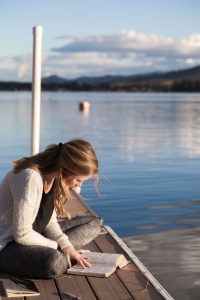Summer is a time for our high school students to enjoy a well-deserved break from their studies, but it is also an important opportunity for them to participate in meaningful, personal development activities. We’ve created a list of five rewarding ways for students to explore new experiences, develop their skills, competencies, and work habits, and stay productive as they plan for success at the post-secondary level.
Get a job
Working during the summer, whether part-time or full-time, gives students the chance to meet and collaborate with colleagues, communicate with diverse clientele, apply their abilities, learn valuable, transferrable skills, network with industry professionals and, of course, earn their own money! In addition to encouraging students to build financial literacy, summer employment is a great way for students to explore their professional interests and goals. Typically, students work for organizations in the fields of hospitality and tourism, retail, customer service, construction and trade labour, food and beverage, and landscaping and home care. To find jobs in your area, we recommend searching databases and job boards like Indeed and LinkedIn, attending high school and community job fairs, and visiting the main website of any local company of interest. To apply for a job, students will need to submit an updated resume and, in some cases, a tailored cover letter. Our Writing Coaches and Educational Consultants are happy to help with both tasks!
Take summer courses
Though school may be the last thing on some students’ minds during the summer, others plan to use their downtime to retake a course in hopes of earning a higher mark or enroll in a class that they would otherwise take during the school year. By taking a required course in the summer, students can make their upcoming year’s academic timetable lighter and more flexible to accommodate elective classes or a spare. Students should choose summer courses in their areas of strength to give themselves the best chance of success.
Before registering for a summer course, students should consider if they want to pursue their studies online or in-person. For the most part, virtual courses are offered in an asynchronous format so that students can work through the modules at their own pace. Due to the self-directed nature of online learning, students need to think about whether they will be able to stay focused and dedicated to their studies. There are several virtual course providers, so be sure to ask an Educational Consultant to make a recommendation. Alternatively, in-person summer learning is condensed; courses are facilitated in a physical classroom and usually take 4-6 weeks to complete. Because the course is compact, students will be studying the same subject for multiple hours per day across most days of the week. Chat with a Consultant about which option might be the best fit!

Participate in extra-curricular activities
Many of our students are athletes who, during the summer, compete in a variety of tournaments, both locally and abroad. These competitions, along with other activities like coaching, umpiring, instructing, recreational leagues, recitals, and artistic performances count as extra-curriculars. On a supplemental application, students would be able to describe not only their roles and responsibilities in these activities, but also what they have learned—and how they have grown—from participating in these experiences. Schools, especially UBC, are invested in applicants’ growth, maturity, and development. It is always a good idea for students to keep track of their involvement and reflect upon their experiences so that they can share their learning. Beyond helping students stay healthy during the summer, extra-curriculars can help students develop and apply a variety of skills, including leadership, teamwork, initiative, achievement, commitment, communication, social responsibility, and breadth, all of which are critical to successful university applications.
Get your driver’s licence
Earning one’s driver’s licence is a rite of passage, which opens many opportunities for travel and leisure activities. Students in British Columbia can pursue their learner’s licence (“L”) when they turn 16. This process entails answering a series of multiple-choice questions, which test one’s knowledge of the rules of the road. If successful, students must drive in the company of a fully licenced supervisor for at least 12 months before registering for their road test. During this time of careful practice, students can also register for a driver’s training course. Once students achieve their novice licence (“N”), they will need to drive for at least 24 consecutive months before taking their Class 5 road test to become fully licenced drivers. In some cases, students can be eligible to take their final test after just 18 months if they have completed an approved driving training course and have not received any infractions during the “N” licence stage. Becoming fully licenced is particularly important for those students who plan on commuting to and from a post-secondary campus—or visiting their friends at other schools. As always, drive carefully!
Complete your First Aid and CPR certifications
As part of their summer employment or volunteerism, many students will need to complete First Aid and CPR training. Some students, for example, work as lifeguards, swimming instructors, children’s sports coaches, or babysitters. For students who have not yet had the opportunity to do so, we suggest finding out where they can register for local courses that can help save someone’s life! The Canadian Red Cross, for example, delivers interactive courses in easy-to-follow steps which include practical, hands-on components and varied training materials. These courses are facilitated over a weekend or series of days at local recreational facilities, schools, and community centers. First Aid and CPR certifications can be listed on one’s resume and, more importantly, can be essential in emergency situations. Even if you are not planning to pursue post-secondary studies in Healthcare, Emergency Response, or Medical Sciences, learning First Aid is a rewarding process that builds confidence, knowledge, and empathy.
Stay tuned for part two and five more recommendations for this summer!

